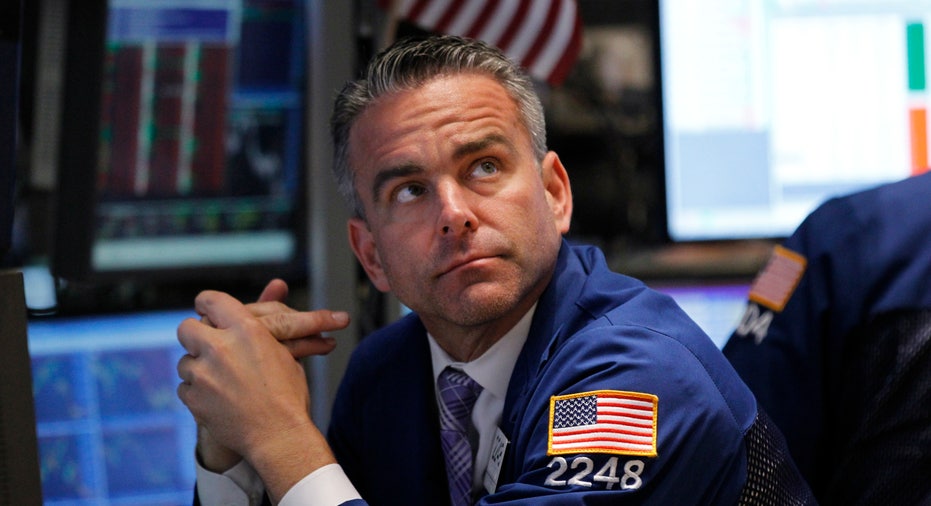Stocks Slide in Late-Day Retreat; Retailers Sink

FOX Business: The Power to Prosper
Wall Street ended lower in a volatile trading session that was driven by a slew of news from across the globe, with many big-name retail companies taking especially heavy losses.
Today's Markets
The Dow Jones Industrial Average fell 66.5 points, or 0.55%, to 11,955, the S&P 500 fell 10.7 points, or 0.87%, to 1,226 and the Nasdaq Composite dipped 33 points, or 1.3%, to 2,579.
In a sign of the tumult, the Dow had jumped as much as 126 points at session highs, just to fall deep into negative territory. Broader markets fell more sharply than the blue chips in late action. This comes on the heels of a selloff on Monday, in which the Dow, S&P and Nasdaq all fell by more than 1%.
Many big financial companies fell sharply late in the day. Morgan Stanley (NYSE:MS), Goldman Sachs (NYSE:GS), UBS (NYSE:UBS) and Credit Suisse (NYSE:CS) took an especially strong hit after Dick Bove, a prominent banking analyst, cut earnings guidance on the firms.
Consumer-discretionary names also struggled after retail sales data disappointed and Best Buy (NYSE:BBY) posted quarterly results that missed expectations. The electronics retailer reported fiscal third-quarter profits of 47 cents a share, shy of estimates of 51 cents. The retailer's revenue came in at $12.1 million, also missing forecasts of $12.13 billion.
Energy companies like ExxonMobil (NYSE:XOM) and Chevron (NYSE:CVX) performed relatively well on the back of a rally in futures markets.
Oil-based energy futures rallied on the day. Market participants cited growing tension regarding Iran as a key driver of the abrupt move that knocked crude oil above the $100 mark. The benchmark crude oil contract traded in New York jumped $2.42, or 2.4%, to $100.14 a barrel. Wholesale RBOB gasoline rallied 2.4% to $2.625 a gallon.
In metals, gold, which plunged in the last session, was essentially unchanged during the regular session, but has since fallen more than 1.7% to $1,639 a troy ounce.
Disappointing Retail Sales Data
The markets got a round of retail sales data on Monday morning. Sales climbed 0.2% in November from the month prior, which is a slimmer gain than the 0.6% increase economists forecast. Excluding the automobile component, sales were up 0.2%, less than estimates of 0.4%. November is the kickoff of the crucial holiday shopping season, and earlier reports have largely been positive.
Fed Stays on Track With Monetary Policy
The Federal Reserve said it plans on holding interest rates at record lows until the middle of 2013, and didn't to unveil any new asset buying to buoy the economy. Some economists had expected the Fed to revamp its communications strategy to offer more clarity on how it will make monetary policy decisions. However, that concept did not come to fruition.
The Fed has held interest rates at a record low range of between 0 and 0.25% since December 2008, when the central bank led by chairman Ben Bernanke was faced with what is seen as one of the worst financial crises since the Great Depression. It also enacted multiple asset buying programs, the last of which, dubbed Quantitative Easing 2, ended in June. Since then, the Fed has been moving to lengthen the average maturity of its balance sheet by selling short-term bonds and buying equal quantities of longer term ones, which it said Tuesday it plans on continuing.
It also announced a coordinated move with several other global central banks, including the European Central Bank, to decrease the cost of dollar funding in world money markets. The move, analysts say, was designed to help European banks that were having difficulty obtaining adequate levels of the currency and to provide liquidity in that marketplace.
Upbeat Economic Data from Germany Overshadowed by Debt Fears
Markets received a batch of positive news from Europe on Tuesday, but the enthusiasm faded on reports suggesting German Chancellor Angela Merkel doesn't support raising the funding limit on the European Stability Mechanism, Europe's future rescue fund. The fund theoretically can be leveraged by distressed countries, when they become unable to borrowing on private markets. However, questions have been raised over whether or not such funds will be sufficiently large to bail out major economies, like Italy, should it become necessary.
A report from the ZEW Centre for Economic Research showed economic sentiment in Germany, Europe's biggest economy, improved for the first time in 10 months in December from the lowest level since 2008.
Spain also had a successful auction of one-year and 18-month bonds, selling 4.94 billion euro compared to its target of 4.25 billion. Still, the success in Spain did little to ease yields on Italian debt. The country's 10-year note is presently yielding 7.13%, a level that many economists say may lead to unsustainable borrowing costs.
The euro changed course and turned negative. The single currency tumbled 1.1% to $1.3039 -- the lowest level since the middle of January. European blue chips were down 0.3%.
Corporate News
DuPont (NYSE:DD) said it expects its 2012 earnings per share to climb 12% to 17% from the prior year, excluding one-time charges.
Foreign Markets
European blue chips fell 0.37%, the English FTSE 100 gained 1.2% to 5,490 and the German DAX dipped 0.2% to 5,774.
In Asia, the Japanese Nikkei 225 slid 1.2% to 8,553 and the Chinese Hang Seng slid 0.69% to 18,447.



















